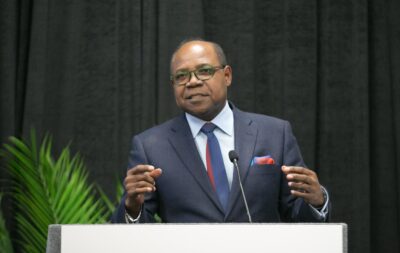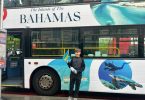Jamaica Tourism Minister Bartlett, who recently received the Tourism Heroes award from the World Tourism Network, addressed this morning the Tourism Recovery discussion hosted by EU Commissioner Elena Kountoura.
Here is a transcript of his speech:
Global travel and tourism have been hardest hit by the COVID-19 pandemic. The UNWTO reported a 65% drop in international tourist arrivals in the first six months of 2020. In 2020, the global travel and tourism market is predicted to experience a loss of 121 million jobs worldwide and USD 3,435 billion in global GDP. Evidently, the sector is facing a crisis of historic proportions with no clear timeline for a return to normalcy in sight. The pandemic has elicited various responses from destinations globally to generally mitigate the economic fallout and prepare for recovery in the post covid19 era. One of the foremost responses has been for tourism stakeholders to pay closer attention to their frameworks for building confidence in their destination security during this period of heightened anxiety and uncertainty. After the initial period of border closures, which brought international tourism to a halt, many destinations, beginning in May/June, began to roll out plans for controlled reopening that generally emphasized reassuring international tourists that it was safe to visit. This has meant a heightened focus on health and safety protocols.
In the initial reopening phase, some destinations limited the reopening of tourism to domestic visitors and between specific countries, through the introduction of a “travel bubble” that allowed tourists to travel feely between two countries which have both recorded relatively low deaths from covid-19, before gradually opening up to international tourists. Other destinations have developed comprehensive health and safety protocols. In Jamaica, my ministry introduced our Tourism Industry Post Covid-19 Protocols, which were developed to ensure the safety of the workers in the industry, as well as to build confidence among travelers to adapt to “the new normal” of additional health and hygiene practices. The protocols, which are contained in an 88-page document, cover all segments of the industry including –Airports; Cruise Ports; Accommodations; Attractions; Tourism Transportation Operators; Craft Traders; Water Sports Operators; General Security and Public Safety; and Mega Events. The COVID-19 Health and Safety Protocols have been endorsed by the World Travel and Tourism Council (WTTC). The protocols have been globally recognized as providing leadership in tourism COVID-19 management arrangements and when fully adhered to, will make Jamaica among the most COVID-19-resilient destinations in the world. Generally, most hotel and resorts island-wide have introduced protocols to mitigate the spread of COVID-19, including increased physical distancing, wearing of masks in public places, removal of shared or self-service items, installation of handwashing/sanitisation stations, visible cleaning taking place frequently, and more contactless/tech-based transactions.
We have also introduced the concept of resilient corridors to boost the country’s ability to manage and trace the movement of tourists along controlled corridors of the island. We have strategically planned the reopening stages, first requiring travelers to stay on the resort grounds and now giving them freedom to visit attractions within the Resilient Corridors using transportation approved under the Tourist Board. The Resilient Corridors, which encompass the majority of the island’s tourism regions, provide the opportunity for visitors to enjoy more of the country’s unique offerings, as many coronavirus (COVID-19)-compliant attractions, located along the Corridors, are authorized for visits by the health authorities. The Resilient Corridors will play a key role as the sector continues on the path to recovery.
This crisis has also provided countries with the opportunity to untap hidden sources of resilience. Reduced international travel has forced destinations to pay closer attention to domestic markets which they have traditionally overlooked or underutilized. My ministry recently launched a Rediscover Jamaica campaign, which is an initiative to encourage Jamaicans to take advantage of the country’s many tourism products and attractions through lower-priced staycation packages based on lower rates. The initiative has received tremendously positive reception from locals, with some hotels reporting 60-80 % reservations from locals. As we look to the future many destinations are realizing the benefit of incentivizing local tourism to offset seasonal downturns in international tourist arrivals as well as volatility in the global tourism .
Recovery plans for the post-COVID era are also well-advanced in most countries. As devastating as the pandemic has been, it will not be permanent. Recovery of the tourism sector will, however, not be an automatic, seamless experience. Recovery has to be carefully planned and managed to ensure the desired results. To this end, my ministry has already unveiled a five-point plan for the recovery of the tourism sector which includes developing robust health and safety protocols, increased training for all segments of the tourism sector, building safety and security infrastructure, and acquiring PPE and hygiene tools. This framework is based on public-private sector collaboration consisting of key stakeholders from the tourism sector, the Ministry of Tourism, and Agencies of the Ministry. It will be supported by two Working Teams – one for general tourism and another for cruise tourism – and a Secretariat. These specially -assigned teams will promote a realistic view of the sector’s baseline or starting position; develop scenarios for multiple versions of the future; establish the strategic posture for the sector as well as a broad direction of the journey back to growth; establish actions and strategic imperatives that will be reflected across various scenarios; and establish trigger points to tackle action, which includes a planned vision in a world that is learning to evolve rapidly.
Global responses have also paid attention to the human side of the impact of the pandemic on tourism specifically as it relates to the well-being of displaced workers and the survival of small businesses. At the onset of the pandemic, my ministry entered discussions with commercial banks for them to provide temporary cash-flow support to businesses and consumers in affected sectors through deferral of principal payments, new lines of credit and other measures. We have also provided fiscal stimulus for displaced workers and business through the provision of various grants and cash transfers. Also, to ensure that tourism workers are using this time to develop competencies for the post-covid19 tourism sector, since April, we have been providing 11 free online courses for tourism workers as part of the Government’s thrust to ensure the continued development of employees in the sector. The courses are offered in areas such as laundry attendant, gift room attendant, kitchen steward/porter, public area sanitation, hospitality team leader, certified banquet server, certified restaurant server, Servsafe training in food safety, certified hospitality supervisor, introduction to Spanish, and disc jock (DJ) certification.
To further strengthen the responsiveness of the sector to the current crisis as well as future ones, the Global Tourism Resilience and Crisis Management Centre intends to establish a tool to facilitate reliable measurement of tourism-related risks as well as to ensure that there is a repository of information with policy implications for international tourism. The idea of The Global Tourism Resilience Barometer (GTRB) will ensure that tourism stakeholders will have be access to a centralized instructional and supportive tool that will help them to develop sound policies and identify mechanisms that will help to reverse divisive and disruptive trends that are threatening the sector. This Framework will essentially assist policy makers and stakeholders to determine the level of tourism resilience readiness across countries. Through the framework and index, stakeholders will be able to:
GOT NEWS? click here
Google News, Bing News, Yahoo News, 200+ publications
– Determine, through a composite score and ranking, how well a country is doing as it relates to tourism resilience.
– Identify Tourism Resilience gaps across countries and, implement corrective strategies to prepare these countries for various disruptions.
– Enable progress on global tourism resilience to be measured over time.
– Access new insights which will deepen understanding of global tourism resilience by enabling comparisons and facilitating conversations based on broader, long- term considerations rather than some of the usual insular considerations.
I am also proposing a Global Tourism Resilience Fund to equip vulnerable countries to be able to respond, manage, and to then recover and grow after disruptions. The Fund would especially target destinations that are recognized as facing high vulnerability but have insufficient financial capacity to prepare for and recover quickly from disruption.
#rebuildingtravel
MEDIA CONTACT: Jamaica Ministry of Tourism, Corporate Communications Division, 64 Knutsford Boulevard, Kingston 5, Tel: 920-4924, Fax: 906-1729






